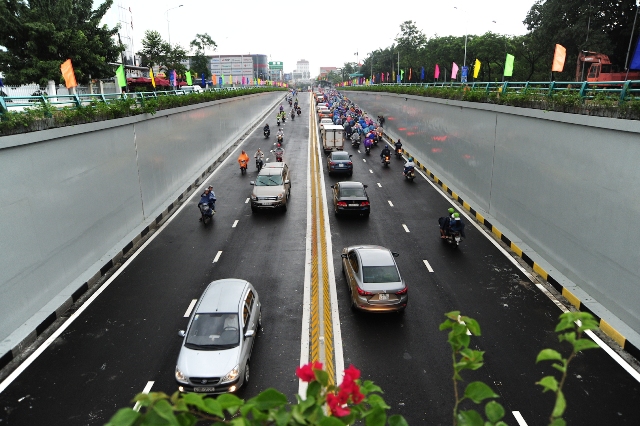Dien Bien Phu-Nguyen Tri Phuong tunnel opens to traffic ahead of APEC
- President Quang underlines top security for APEC 2017
- Vietnamese signature products introduced to APEC delegates
- APEC 2017: International media centre opens in Da Nang
The tunnel is one of the key transport projects under the city’s sustainable development master plan sponsored by the World Bank.
As an important northern gateway to the city, the intersection is usually so busy with a large amount of vehicles and serious congestion used to happen at the place during peak hours.
 |
| Dien Bien Phu-Nguyen Tri Phuong tunnel opens to traffic ahead of APEC. |
The construction was started on December 29, 2016 by a joint venture of Thuan An Construction and Trading Development JSC and Thang Long Corporation – JSC. The project was completed two months ahead of the deadline and is now ready to serve the APEC Economic Leaders’ Week from November 6-11.
The project, costing 120 billion VND funded by the World Bank, includes an underground tunnel with 4.75m high and 80m long, a 180m long semi-tunnel road and a 149m-long open-air road.
He added that the completion of the Dien Bien Phu - Nguyen Tri Phuong junction is crucially important, contributing to ensuring the organisation of traffic to serve the APEC 2017 event, thus promoting the image of a civilised and modern Da Nang to international friends.
On this occasion, Chairman of Da Nang People's Committee Huynh Duc Tho awarded VND200 million to the construction unit for the project’s advanced progress.
At the opening ceremony, Deputy Chairman of the Da Nang Municipal People’s Committee Nguyen Ngoc Tuan said the tunnel project will make a good impression on international visitors, contributing to promoting the image of a modern and dynamic Da Nang.
The APEC 2017 Economic Leaders’ Week with important events activities to take place in Da Nang city and Quang Nam province is considered a central mission of Vietnam’s foreign affairs between now and 2020.

